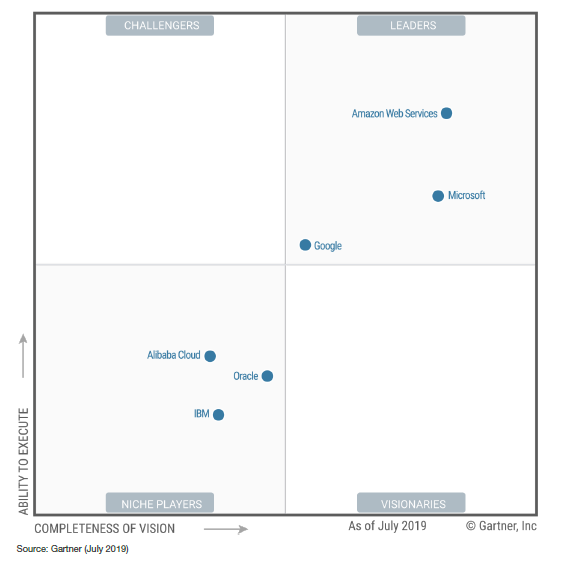 CLOUD
CLOUD
 CLOUD
CLOUD
 CLOUD
CLOUD
Information technology analyst firm Gartner Inc. says Google LLC’s cloud infrastructure services are becoming more complete, helping the company move up the rankings in its latest Magic Quadrant.
Gartner’s 2019 Magic Quadrant for Infrastructure-as-a-Service published today ranks Google Cloud as a “leader,” coming in third place out of just six providers that made the cut. Google first made the grade as a leader in 2018, but Gartner said its position has improved as it has added new analytics capabilities and built on its ability to execute.
Amazon Web Services Inc. remains in the number one spot, while Microsoft Corp.’s Azure cloud retains second place, even though Gartner criticized it for having some reliability issues in recent months.
The latest graphic also demonstrates the enormous gap between the big three and their main challengers, with Alibaba Cloud, a subsidiary of Alibaba Group, IBM Corp. and Oracle Corp. all cut adrift in the “niche players” category.

With regard to Google, Gartner said its stature has grown thanks to its expertise in data analytics and its machine learning services, which are helping it become more of a “strategic vendor.”
“Running applications is important, but you also need to make sense of the data they generate,” said Google Cloud President Rob Enslin in a blog post on Gartner’s report. “Google Cloud has highly differentiated offerings in the realm of data analytics and machine learning.”
Google still faces a number of challenges, however, including a need to develop out its processes for dealing with enterprise accounts. It also lacks a big base of managed service providers, and its sales coverage remains thin, Gartner said.
Amazon also continues to go from strength to strength, Gartner said. In its assessment, the analyst firm said AWS is the most “enterprise-ready, mission critical hyperscale provider” and that it also covers the most use cases with its new services.
On the downside, Gartner noted that AWS doesn’t always offer the best prices and that its main storage service hasn’t seen a price reduction since 2014.
As for Microsoft, Gartner said Azure’s main strength is the integration of its software products such as Office with its cloud services. That enables enterprises to build hybrid applications more easily. In addition, Gartner praised Azure for its “strong edge and Internet of Things strategy.”
Gartner’s main concern with Azure is that the service has been hit by a number of outages in recent months, though Microsoft has promised to try to rectify those problems with more availability zones.
Support our mission to keep content open and free by engaging with theCUBE community. Join theCUBE’s Alumni Trust Network, where technology leaders connect, share intelligence and create opportunities.
Founded by tech visionaries John Furrier and Dave Vellante, SiliconANGLE Media has built a dynamic ecosystem of industry-leading digital media brands that reach 15+ million elite tech professionals. Our new proprietary theCUBE AI Video Cloud is breaking ground in audience interaction, leveraging theCUBEai.com neural network to help technology companies make data-driven decisions and stay at the forefront of industry conversations.